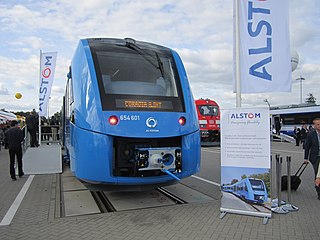
A fuel cell is an electrochemical cell that converts the chemical energy of a fuel and an oxidizing agent into electricity through a pair of redox reactions. Fuel cells are different from most batteries in requiring a continuous source of fuel and oxygen to sustain the chemical reaction, whereas in a battery the chemical energy usually comes from substances that are already present in the battery. Fuel cells can produce electricity continuously for as long as fuel and oxygen are supplied.

A hydrogen vehicle is a vehicle that uses hydrogen fuel for motive power. Hydrogen vehicles include road vehicles, rail vehicles and hydrogen-fueled space rockets, as well as hydrogen-powered ships and aircraft. Motive power is generated by converting the chemical energy of hydrogen to mechanical energy, either by reacting hydrogen with oxygen in a fuel cell to power electric motors or, less commonly, by hydrogen internal combustion.
Ballard Power Systems Inc. is a developer and manufacturer of proton exchange membrane (PEM) fuel cell products for markets such as heavy-duty motive, portable power, material handling as well as engineering services. Ballard has designed and shipped over 400 MW of fuel cell products to date.

The hydrogen economy is an umbrella term that draws together the roles hydrogen can play alongside renewable electricity to decarbonize those sectors and activities which may be technically difficult to decarbonize through other means, or where cheaper and more energy-efficient clean solutions are not available. In this context, hydrogen economy encompasses hydrogen's production through to end-uses in ways that substantively contribute to avoiding the use of fossil fuels and mitigating greenhouse gas emissions.

A hydrogen station is a storage or filling station for hydrogen fuel. The hydrogen is dispensed by weight. There are two filling pressures in common use: H70 or 700 bar, and the older standard H35 or 350 bar. As of 2021, around 550 filling stations were available worldwide.
Micro combined heat and power, micro-CHP, µCHP or mCHP is an extension of the idea of cogeneration to the single/multi family home or small office building in the range of up to 50 kW. Usual technologies for the production of heat and power in one common process are e.g. internal combustion engines, micro gas turbines, stirling engines or fuel cells.
A hydrogen infrastructure is the infrastructure of hydrogen pipeline transport, points of hydrogen production and hydrogen stations for distribution as well as the sale of hydrogen fuel, and thus a crucial prerequisite before a successful commercialization of automotive fuel cell technology.
A hydrogen ship is a hydrogen fueled ship, using an electric motor that gets its electricity from a fuel cell, or hydrogen fuel in an internal combustion engine.

A fuel cell bus is a bus that uses a hydrogen fuel cell as its power source for electrically driven wheels, sometimes augmented in a hybrid fashion with batteries or a supercapacitor. The only emission from the bus is water. Several cities around the world have trialled and tested fuel cell buses, with over 5,600 buses in use worldwide, the majority of which are in China.

In transportation, the original (2003) generic term "hydrail" includes hydrogen trains, zero-emission multiple units, or ZEMUs — generic terms describing [[rail vehicles], large or small, which use on-board hydrogen fuel as a source of energy to power the traction motors, or the auxiliaries, or both. Hydrail vehicles use the chemical energy of hydrogen for propulsion, either by burning hydrogen in a hydrogen internal combustion engine, or by reacting hydrogen with oxygen in a fuel cell to run electric motors, as the hydrogen fuel cell train. Widespread use of hydrogen for fueling rail transportation is a basic element of the proposed hydrogen economy. The term has been used by research scholars and technicians around the world.
The lithium-titanate or lithium-titanium-oxide (LTO) battery is a type of rechargeable battery which has the advantage of being faster to charge than other lithium-ion batteries but the disadvantage of having a much lower energy density.

ElringKlinger AG is a German automotive supplier and car spare parts manufacturer headquartered in Dettingen an der Erms, Germany. As a worldwide development partner and original equipment supplier of cylinder-head and specialty gaskets, plastic housing modules, shielding components for engine, transmission, exhaust systems and underbody, exhaust gas purification technology as well as battery and fuel cell components ElringKlinger provides its products to almost all of the world's vehicle and engine manufacturers. As at May 3, 2017, in addition to the parent company, the ElringKlinger Group included 44 fully consolidated subsidiaries.

The Bloom Energy Server or Bloom Box is a solid oxide fuel cell (SOFC) power generator made by Bloom Energy, of Sunnyvale, California, that takes a variety of input fuels, including liquid or gaseous hydrocarbons produced from biological sources, to produce electricity at or near the site where it will be used. It withstands temperatures of up to 1,800 °F (980 °C). According to the company, a single cell generates 25 watts.

ITM Power plc is an energy storage and clean fuel company founded in the UK in 2001. It designs, manufactures, and integrates electrolysers based on proton exchange membrane (PEM) technology to produce green hydrogen using renewable electricity and tap water. Hydrogen produced via electrolysis is used for mobility, Power-to-X, and industry.
Power-to-gas is a technology that uses electric power to produce a gaseous fuel. When using surplus power from wind generation, the concept is sometimes called windgas.
Ceres Power Holdings plc is a UK developer of solid oxide electrolyzer cell and solid oxide fuel cell technology for use in distributed power systems aimed at decarbonising cities, factories, data centres and electric vehicle charging. Founded in 2001, it is headquartered at Horsham in the UK. It is listed on the London Stock Exchange. It is also classified by the LSE Green Economy Mark, which recognises listed companies that derive more than 50% of their activity from the green economy.
The World Hydrogen Council is a global CEO-led initiative of 132 leading energy, transport, industry and investment companies with a united and long-term vision to develop the hydrogen economy. The key ambitions of the Hydrogen Council are to 1) accelerate significant investment in the development and commercialization of the hydrogen and fuel cell sectors and 2) encourage key stakeholders to increase their backing of hydrogen as part of the future energy mix.
GenCell Ltd. is an Israeli company developing hydrogen alkaline based fuel cell systems and solutions that replace diesel generators with clean backup power for utilities, homeland security, healthcare and automated industries, as well as Ammonia (NH3) based off-grid power solutions.

Bruno Georges Pollet BSc(Hons) MSc PhD FRSC, is a French electrochemist and electrochemical engineer, a Fellow of the Royal Society of Chemistry, full professor of chemistry, director of the Hydrogen Research Institute and director of the Green Hydrogen Lab at the Université du Québec à Trois-Rivières in Canada. He has worked on Hydrogen Energy in the UK, Japan, South Africa, Norway and Canada, and has both industrial and academic experience. He is regarded as one of the most prominent Hydrogen experts and one of the Hydrogen "influencers" in the world.
Fukushima Hydrogen Energy Research Field (FH2R) is the world's largest hydrogen production facility using renewable energy. It is located in Fukushima Prefecture in Japan. The construction was started on 2018 and completed in 2018. It was inaugurated by Shinzo Abe in 2020. The facility uses 10 MW of solar electricity which is installed near the production facility. The facility can produce 1,200 Nm3 of hydrogen per hour. It was jointly established by the New Energy and Industrial Technology Development Organization, Toshiba Energy Systems & Solutions Corporation, Tohoku Electric Power and Iwatani Corporation.









